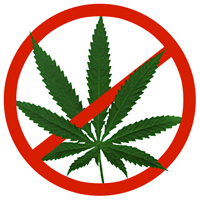- Top New Articles:
- 5 Steps To Quit Weed
- 50 Reasons to Quit Weed
- Coping With Withdrawals
- Health Effects of Weed
- Weed Affecting Family
- Post-Weed Depression
- Marijuana And Cancer
- Your Weed Lifestyle
- Quit Weed & Dream
- Addiction Of Weed
- Potency Of Weed Today
- Weed Detox Story

Quit Marijuana
The Complete Guide
QUIT WEED ARTICLES
ASK A QUESTION


Managing Your Post-
Marijuana Depression
Marijuana, whether it is smoked or ingested, produces a euphoric, relaxed and even apathetic sensation in the marijuana user, so it only stands to reason that when discontinuing its use people often report feelings of severe depression, anxiety and agitation.
In fact, depression, and all of its accompanying side effects, is one of the most problematic and most often reported side effects of marijuana withdrawal, affecting approximately 25 percent of those attempting to quit.
Depression is a very serious medical condition, but fortunately, most people who experience its symptoms while trying to quit marijuana will only do so for a short while, as their brain readjusts to being "smoke free."
In the meantime, however, these symptoms can be frightening and quite debilitating, and may tempt the potential "quitter" to begin lighting up again.
The symptoms of depression include:
- Difficulty sleeping or sleeping too much
- Difficulty concentrating
- Short-term memory problems
- Loss of interest in things once enjoyed
- Loss of appetite
- Anxiety
- Irritability
- Feeling hopeless or worthless
- Thoughts of suicide
Needless to say, any or all of these symptoms have the ability to significantly impact normal day-to-day functioning and can create problems at work, school and home, making it difficult to perform everyday tasks and form and maintain relationships.
Managing Depression After Quitting Marijuana
As stated earlier, most depression symptoms will begin to ease on their own as the marijuana cessation period lengthens, but there are several effective treatment strategies to help manage these symptoms until they do. Among them are:
Medication
Medication is a very effective treatment alternative for the management of temporary depression symptoms. The medications used primarily for this purpose are antidepressants belonging to the class of drugs called "selective serotonin reuptake inhibitors," or SSRIs.
These drugs, which include well-known names such as Prozac, Paxil and Zoloft, work by altering the effect of certain neurotransmitters in the brain which are responsible for mood and emotional stability.
Behavioral Therapy
Behavioral therapy, also known as cognitive restructuring, helps people who are recovering from marijuana addiction change the way they react to certain stimuli, and get to the core of their depression symptoms.
Exercise
Exercise is one of the best ways to beat the temporary blues associated with post-marijuana depression. Strenuous exercise, such as running or cycling, releases chemicals in the brain which produce a temporary euphoric feeling.
This sensation, often referred to as a "runner's high," can last well after the exercise has been concluded. Moreover, a regular exercise routine will help with sleep-sleep which often comes difficult when people are depressed.
Meditation
When most people think of meditation they probably picture an eastern monk of some kind chanting to the Gods, but modern meditation has come a long way and is often prescribed as a remedy for depression.
In meditation, people are taught how to completely relax their bodies while taking focused, measured breaths and clearing their mind of any outside distractions.
By focusing on their breathing and nothing else, people are able to forget their troubling, depression-worsening thoughts, such as regrets about the past and anxiety about the future, and replace them with more positive and uplifting ones.
For the marijuana smoker attempting to quit, the risk of serious depression may sound like a lot to handle, but when weighed against the potential health hazards of not quitting, including cancer, diabetes and even brain damage, temporary and treatable depression is a very small price to pay.
What if you can't quit weed?
If you are having trouble quitting weed on your own, make sure to check out the famous quit weed guide. This course uses proven methods such as NLP, and other modern startegies including Natural Marijuana Detox, to help you quit weed easily on your own.
Copyright© 2014 Quit Weed